|
Richard Johnson (1755–1827)
[updated 19 February 2015] [more coming!] [see also Anglican Church League]
|
|
arise and shine upon them
|
 |
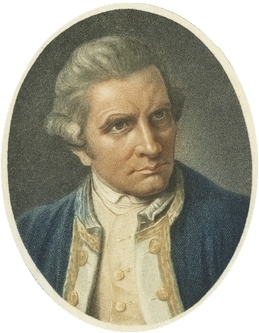
Capt James Cook
 |
From John Newton’s diary:
Tuesday 8 July 1777
“My leisure time and rather more than I can well spare taken up with reading the accounts of the late voyage of Capt. Cook in the Southern Ocean and round the Globe. Teach me to see thy hand and read thy name in these relations. Thy providence and goodness are displayed in every clime. May I be suitably affected with the case of the countless thousands of my fellow creatures, who know thee not, nor have opportunities of knowing thee.
Alas that those who are called Christians, and who venture through the greatest dangers to explore unknown regions, should only impart to the inhabitants examples of sin and occasions of mischief, and communicate nothing of thy Gospel to them." |

"Lord hast thou not a time for these poor benighted souls;
when thou wilt arise and shine upon them?”
|
Sunday 13 July 1777
"The week is closed upon us in peace… Hymn number 289" [corrected to read 279].
This hymn, The Sea, which draws on Newton’s first-hand experience as a mariner, appears to have been prompted
by his reading of Captain Cook’s Journal during the week.
It was later published in Olney Hymns, 1779, Book 2, Hymn 87.
|
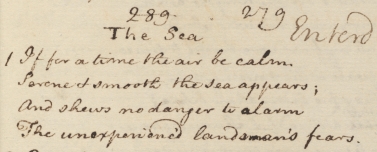
The Sea
If for a time the air be calm,
Serene and smooth the sea appears;
And shows no danger to alarm
The unexperienced landsman's fears. |
But if the tempest once arise,
The faithless water swells and raves;
Its billows, foaming to the skies,
Disclose a thousand threatening graves.

My untried heart thus seemed to me,
(So little of myself I knew)
Smooth as the calm unruffled sea,
But ah! it proved as treacherous too!
 |
|
|
a trip to the seaside
|
|
|

In the summer of 1784,
the Newtons took their orphaned niece Eliza
to bathe at the seaside for her health.
John Thornton had invited Newton to accompany him to Lymington
and the Isle of Wight.
A stranger, Charles Etty,
invited Newton to stay
at his home near Lymington en route.
|
|
|
|
Johnson of Boldre
|
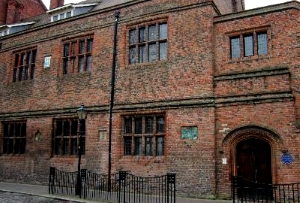
Hull Grammar School |
Richard Johnson was born in Welton, Yorkshire. He attended school at Kingston-upon-Hull. William Wilberforce attended this school from 1768-1770 and again briefly in 1771. Joseph Milner, the Head Teacher, was converted in 1770.
Johnson was employed in farming and teaching before becoming a sizar at Magdalene College, Cambridge. He graduated BA in 1784. |
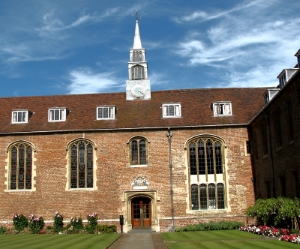
Magdalene College |
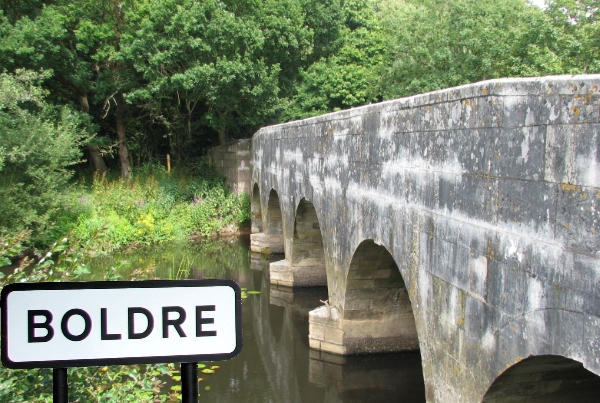
Boldre Bridge |

"My dear and worthy old hostess"

"those happy occasions, which I have enjoyed at Boldre Bridge" |
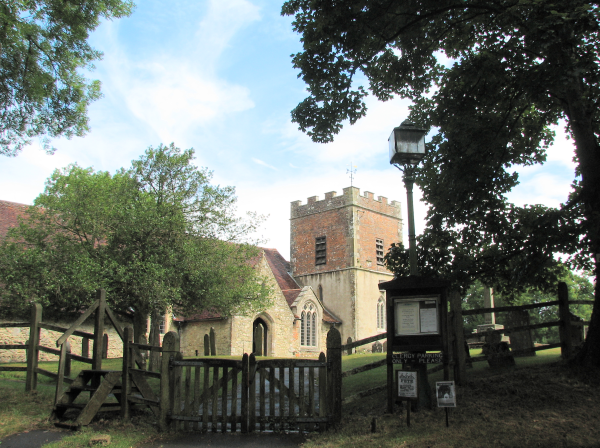
St John's, Boldre |
In December 1783, Richard Johnson had been licenced as curate to St John’s, Boldre, a village in the New Forest only 3 miles from Etty’s home.
It is conceivable that Newton and Johnson may have met there in the late summer of 1784. Certainly they subsequently knew the same group of friends in the Lymington area.
|
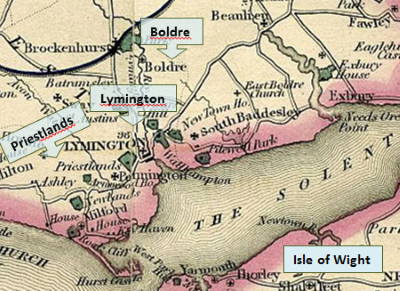 |
|
From Johnson's letters: |

my friends at Lymington, Boldre, Priestlands, & the Isle of White[Wight] |
and in particular:
 Mr Etty Mr Etty |
And it was only a few months later, on 25 March 1785, that Newton reported to William Bull:
“Yesterday I put Mr. Johnson in my pulpit,
(who I think gives us an earnest of a judicious good preacher).”
|
|
|
|
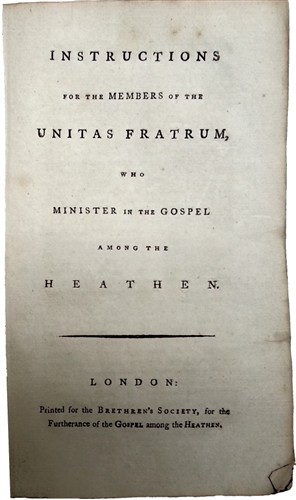 |
Instructions
to the Missionaries of the heathen
|
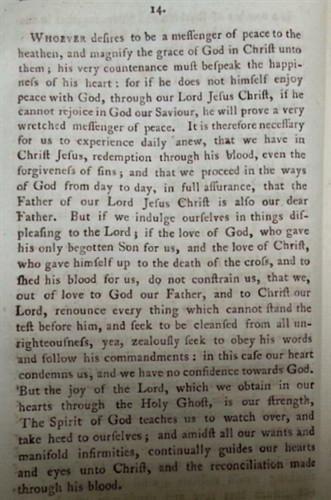 |
|
Newton admired the missionary work of the Moravians. He had invited their UK leader Benjamin La Trobe to join the Eclectic Society. |
As David Brown left for India, Newton asked La Trobe if he might have a copy of their recent publication:
Instructions to the Missionaries of the heathen [download from here]
The Elders' Conference Minutes of the Moravians for 31 December 1785 states: |
"Brother La Trobe mentioned that he would willingly with the leave of the Conference give
the Instructions to the Missionaries of the heathen to Mr Newton, Cecil, Foster, Sir Charles Middleton, Littleton, Abdy etc
as persons that really seek to have an insight into the Brethrens’ mode of proceeding among the heathen." |
|
|
|
|
|
Transportation
|
|
The British Government had been transporting convicts from England to penal colonies in North America for many decades. But after the American War of Independence they needed to look elsewhere. |
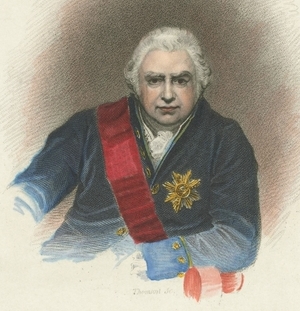
Sir Joseph Banks |
Captain Cook had written glowing reports of New Holland in the Southern Hemisphere. Joseph Banks, botanist on Cook’s ship the Endeavour, recommended Botany Bay as an ideal location, not only for accommodating an overflow of felons, but additionally as having agricultural potential. On 18/19 August 1786 Prime Minister Pitt’s cabinet decided that the new penal settlement would be at Botany Bay. Lord Sydney, Home Secretary, formally asked the Treasury to make arrangements for ships and supplies. HMS Sirius was commissioned at Deptford on 25 October, under the command of Captain Arthur Phillips, who was to be the Governor of New South Wales. |
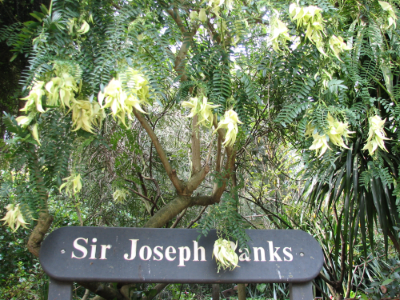
Banks plants in
Chelsea Physic Garden |
|
|
Oh, if Johnson is the man
|
The evangelical circle in London recognised an opportuntity for spreading the Gospel. Could the First Fleet officially include a chaplain to minister to the crew and convicts, and to establish the Gospel on a new continent?
Newton approached Richard Johnson, who hesitated, then accepted. |
|
[see also Anglican Church League] |
|
|
|
Although key players Newton, Wilberforce, Thornton and Foster were all “out of town” for the summer of 1786, it did not stop plans being laid: |
|
1786
23 September |
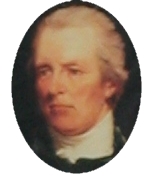 |
William Pitt, Prime Minster, to Wilberforce:
“The colony for Botany Bay will be much indebted to you for your assistance in providing a chaplain… Seriously speaking, if you can find such a clergyman as you mention we shall be very glad of it; but it must be soon.” |
|
22 October |
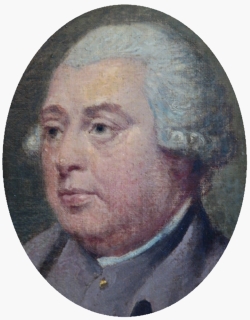 |
John Thornton took Johnson aboard a hulk at Woolwich, to meet “two hundred and fifty of his future congregation”, which would eventually total some 1,400 convicts, mariners and, crew. |
A prison ship,
or hulk,
at Woolwich |
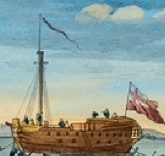 |
Crimes meriting transportation varied greatly – from stealing a cotton handkerchief (valued at 10d — less than £5 in today’s money) – to murder.
An advance search at www.oldbaileyonline.org reveals individual reasons for transportation. |
|
24 October |
On 24 October 1786, a Royal Warrant was provided for
“our trusty and well-beloved Richard Johnson” |
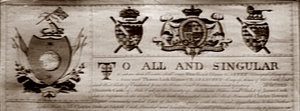 |
|
|
GEORGE THE THIRD, &c
To our Trusty and Well Beloved Richard Johnson, Clerk, greeting.
We do, by these Presents, constitute and appoint you to be Chaplain to the Settlement within Our Territory called New South Wales, You are, therefore, carefully and diligently to discharge the Duty of Chaplain, by doing and performing all and all manner of things thereunto belonging, and you are to observe and follow such Orders and Directions, from time to time, as you shall receive from Our Governors of Our said Territory, for the time being, or any other superior officer, according to the Rules and Discipline of War.
Given at Our Court of St James’s, the Twenty-fourth Day of October, 1786, in the Twenty-sixth year of Our Reign.”
By His Majesty’s Command.
(Signed) SYDNEY |
|
Excitement and support for Johnson was mounting amongst believers. |
|
25 October |
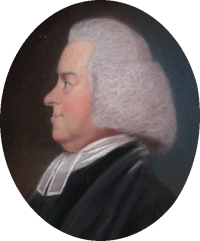 |
William Bull wrote to ask Newton: “How is Mr Johnson’s Botany Bay scheme likely to end?”
Bull had seen “a copy of his feelings upon the occasion” and was “filled with a thousand thanks” that he had not been called overseas himself. “A call to be bound to the stake does not seem to me more painful.” |
|
|
|
Johnson had written [more here]:
“For several nights and days both my sleep and appetite were in a great measure taken away. I did little else than weep and sigh, whilst I trust both by fervent prayer and fasting. I implored divine direction what to do in an affair of so weighty moment...” |
|
27 October |
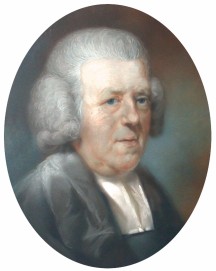 |
Newton replied:
“A minister who should go to Botany Bay without a real call from the Lord…
had better run his head against a stone wall.”
|
|
|
But Johnson had reflected on “the power and promises of God to protect me in any place or situation wherein, in the line of duty, I followed the leading of providence” and now felt called. |
|
|
|
He “is humble and simple-hearted” wrote Newton. “I think he would not have thought of this service had it not been proposed to him; for some time he wished to decline it, but he could not, he durst not.”
Bearing in mind Bull’s painful thoughts, Newton added, “I should not advise him to consult with you upon the point.” |
|
|
|
Nor was Newton himself envious of Johnson, as he confided in Bull: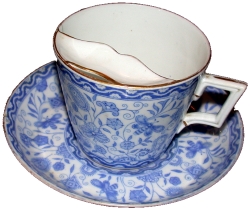
“I must have my tea, my regular hours, and twenty little things which I can have when my post is fixed. I should shrink at the thought of living upon seals and train oil…
but the Lord inspired the Moravian missionaries with resolution to court hardships like these, so that they might win souls, and he gave them success.
"Oh, if Johnson is the man, whom the Lord appoints to the honour of being the first to carry the glad tidings into the southern hemisphere, he will be a great and honoured man indeed. |
|
|
|
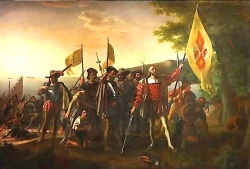
"Let the world admire Columbus, Drake, and Cook.
Johnson will in my view be unspeakably superior to them all.
Christopher Columbus landing at San Salvador 1492 |
|
|
|
"If I am not mistaken, sooner or later the gospel must be preached in the South Seas; if so, there must be a beginning. Perhaps this is the time. Perhaps this is the final cause of our attempting a settlement in New Holland. Often when politicians have one thing in view, the Lord has another; and their plans succeed in order to the accomplishment of his.” |
|
Newton wrote some lines of encouragement for the young missionary: |
|
Omicron to Johnson |
|
|
The Lord who sends thee hence, will be thine aid:
In vain at thee the lion, Danger, roars;
His arm and love shall keep thee undismayed
On tempest-tossèd seas, and savage shores. |
Go, bear the Saviour's name to lands unknown,
Tell to the southern world his wondrous grace;
An energy Divine thy words shall own,
And draw their untaught hearts to seek His face. |
|
|
Many in quest of gold or empty fame
Would compass earth, or venture near the poles:
But how much nobler thy reward and aim—
To spread His praise, and win immortal souls. |
|
|
28 October |
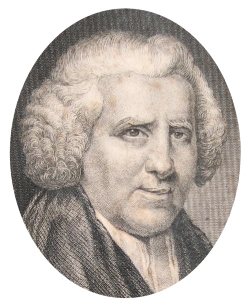 |
Henry Venn wrote to his daughter:
To be the means of sending the Gospel to the other side of the globe—what a favour!”” |
|
1 November |
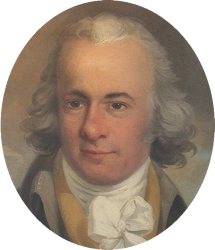 |
Newton spurred on Wilberforce:
“I congratulate you, on the success of your application in favour of the New Holland Settlement, which I hope may be productive of very important and beneficial consequences. The simplicity of Mr Johnson’s views, his integrity and humility, give me a pleasing expectation, that the Lord himself has chosen and called him to this service – if so, we may cheerfully expect a happy event." |
|
|
|
|
|
13 November |
 |
The Eclectic Society met on 13 November 1786 to discuss:
What is the best method of planting and propagating the Gospel in Botany Bay?
|
|
|
|
|
|
14 November |
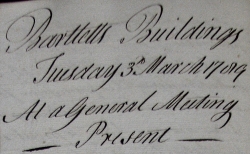
|
The committee of the Society for Promoting Christian Knowledge, SPCK, had received a request from the Archbishop of Canterbury (John Moore) “that they would furnish the Rev Mr Johnson, who is going to Botany Bay as chaplain to the convicts, with some Bibles and other religious books for the use of his charge”. |
|
|
|
|
|
15 November |
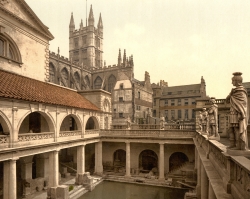 |
Wilberforce was not strong, and his doctor advised him to visit Bath Spa for the waters.
Newton followed by post with further encouragement: |
|
|
Bath Spa |
"To you, as the instrument, we owe the pleasing prospect of an opening for the propagation of the Gospel in the Southern Hemisphere. Who can tell what important consequences may depend upon Mr Johnson's going to New Hollands! It may seem but a small event at present.
So a foundation stone, when laid, is small compared with the building to be erected upon it;
but it is the beginning and the earnest of the whole." |
|
|
|
 |
|
|
|
"This small beginning, may be like the dawn, which advances to a bright day, and lead on to the happy time, when many nations, which now sit in darkness, and in the region of the shadow of death, shall rejoice in the light of the Sun of Righteousness." |
|
|
|
|
28 November |
Johnson was invited to attend the meeting of the SPCK “when it was resolved to present to him from the society’s stores the following books and tracts for his charge”
A list follows of over 4,000 books and tracts Johnson took with him. |
 |
|
|
* Reproduced by permission of the Syndics of Cambridge University Library (SPCK archive) |
|
28 November |
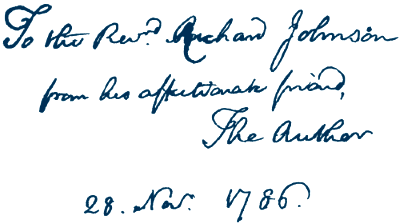 |
Newton’s Messiah, 2 volumes of 50 sermons on the texts in Handels’ Messiah ,had been published that summer.
He presented Johnson with a copy, “from his affectionate friend, the author”. |
|
|
Newton later addressed his letter to Johnson as:
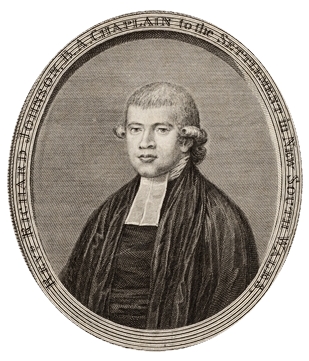
‘The Most Reverend the Primate and Patriarch
of the Southern Hemisphere’
|
|
29 November |
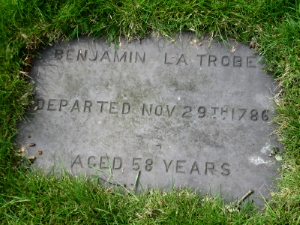
Benjamin LaTrobe's grave |
On 29 November 1786, one of the Eclectic Society members died.
“Mr Latrobe dead! Surely not” wrote Newton to Bull. “Why, he was a great man—a useful man. Oh! How he will be missed!”
Newton answered his own “childish” questions on the mystery of losing one of “an eminency of gifts, graces and usefulness” by pointing out how the Lord can “show us that He can carry on His work very well without him.” |
|
|
Moravian
Elders' Conference Minutes
Vol II
|
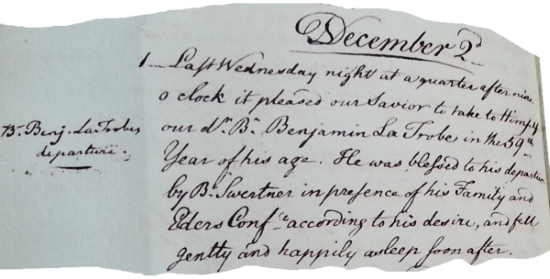 "Last Wednesday night at a quarter after nine o’clock it pleased our Saviour to take to Himself our dear Brother Benjamin La Trobe in the 59th year of his age. He was blessed to his departure by Brother Swertner in presence of his family and Elders’ Conference – according to his desire, and fell gently and happily asleep soon after." "Last Wednesday night at a quarter after nine o’clock it pleased our Saviour to take to Himself our dear Brother Benjamin La Trobe in the 59th year of his age. He was blessed to his departure by Brother Swertner in presence of his family and Elders’ Conference – according to his desire, and fell gently and happily asleep soon after." |
|
Another shock was to follow within days. |
|
4 December |
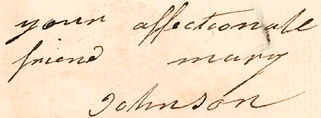
Mary Johnson |
On 4 December 1786, Richard Johnson was married to Mary Burton, of St Mildred’s, Poultry, a few hundred yards from St Mary Woolnoth.
“she is about ½ Baptist & ½ Methodist” is how Johnson described his wife |
|
|
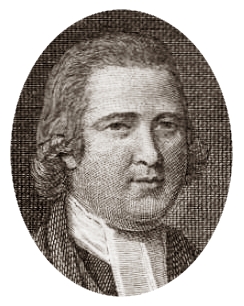 |
Henry Foster performed the ceremony. |
|
Why the shock? |
|
|
|
Up till now, Henry Foster and Ambrose Martin the Banker had been doing cold-calls and had obtained subscriptions for more than £220 towards Johnson’s expenses. |
|
7 December |
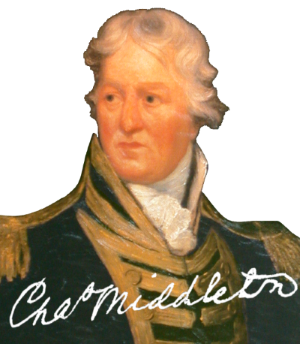
Sir Charles Middleton |
But “Mr Johnson has since married’ sighed Newton to Sir Charles Middleton, which ‘occasioned a train of expenses which were not thought of at the time they called upon their friends’.
Poor Foster and Martin. ‘After what was expressed in the preamble of the former subscription, they know not well how to set about a second, especially as the time is now so very short’. Thornton had ‘already been so very liberal in the affair’ that Newton felt he couldn’t be expected to do more.
Unless Middleton thought it proper and practicable to get hold of an additional fifteen guineas from his connexions, it would be better ‘not to mention the business at all to the Governor, lest it should prove inconvenient to Mr Johnson by causing more to be expected from him than he may be able to perform’. |
|
|
|
|
Fetter Lane
|
Further Contact with the Moravians
Newton greatly admired the Moravian missionaries.
His respect for them had done much to change opinions across denominations for Moravians.
He felt Johnson could learn much from their “resolution to court hardships”
and advised him to consult the church in Fetter Lane.
|
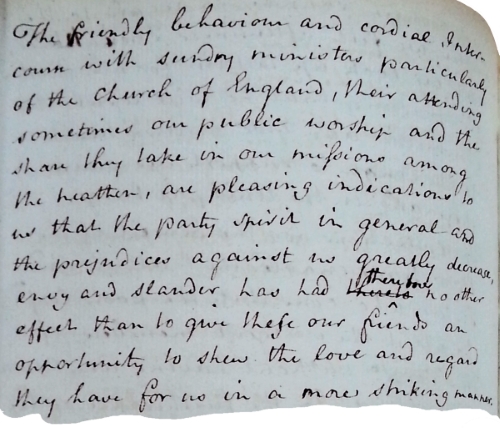 |
A couple of days later, the Moravians entered in their Memorabelia for that year, their appreciation of Newton's influence:

"The friendly behaviour and cordial intercourse with sundry ministers particularly of the Church of England, their attending sometimes our public worship and the share they take in our missions among the heathen, are pleasing indications to us that the party spirit in general and the prejudices against us greatly decrease, envy and slander has had therefore no other effect than to give these our friends an opportunity to show the love and regard they have for us in a more striking manner."
Fetter Lane Congregational Diary, Memorabelia 1786 |
|
|
Acknowledgements:
Cowper & Newton Museum
Hants Record Office
Harvard University Library
Lambeth Palace Library
Moravian Church House Archives
The Pratt Green Trust
Princeton University
Images from the State Library of NSW
The John Newton Project
The Waits Website
|
Marylynn Rouse, 16/01/2015
|
|
|